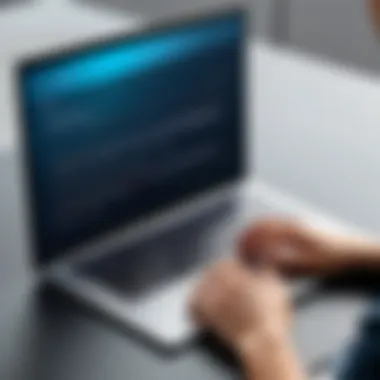The Importance of Sending Thank You Emails After Interviews


Intro
In the competitive landscape of job searching, every small action can leave a significant impression. Sending a thank you email post-interview is more than a polite gesture; it shows professionalism and reinforces your interest in the position. Many candidates overlook this crucial step. However, understanding its importance can place you ahead of the game.
Thanking an interviewer can elevate a candidate's stature, showcasing their enthusiasm and dedication. In the realm of technology, where precision and attentiveness are crucial, a thank you email can be the subtle differentiating factor that can sway a hiring decision. This segment will examine the broader context and importance of this often underestimated practice.
Tech Trend Analysis
Overview of the current trend
There is a noticeable trend in the tech industry that highlights the necessity of effective communication throughoutemployerinteraction. More candidates than ever realize that following up with a thank you email can bolster their chances of securing a job offer. Many companies emphasize cultural fit and decision-making attributes. An enthusiastic, well-crafted email illustrates strong interpersonal skills, pivotal in collaborative tech environments.
Implications for consumers
For consumers, especially those deeply embedded in tech, being the perfect candidate often extends beyond qualifications, technical knowledge, and experience. A thoughtful follow-up symbolizes reliability and persistence. In an age where first impressions matter, this practice invites companies to view candidates not just as applicants but as potential long-term assets.
Future predictions and possibilities
Looking ahead, it's essential to predict that the trend of sending thank you emails will likely establish deeper roots in professional circles. Companies might develop more extensive feedback measures based on candidates' post-interview communications. Moreover, remote arrangements increase the necessity for strong written communication, making follow-ups even more critical. Future directorial roles could increasingly assess applicants' ability to convey sentiments in the digital realm.
Rationale Behind Sending Thank You Emails
An essential aspect to consider is the underlying reasons for sending a thank you email. It shows respect for the interviewer's time and effort. Further, it provides an additional opportunity to reinforce key points discussed during the interview. This can enhance your candidacy by reiterating your fit for the role. Moreover, it can showcase your thoughtfulness, ultimately serving as a positive reflection of your character. The familiar phrase about “standing out” certainly applies here, albeit without cliché.
Practical Tips for Crafting an Effective Message
- Be Prompt: Ensure your email is sent within 24 hours of the interview.
- Personalize It: Mention specific discussions from the interview to illustrate engagement.
- Keep It Concise: Don't ramble; maintain professionalism without adding unnecessary fluff.
- Proofread: Ensure clarity by checking spelling and grammar. Attention to detail is crucial in tech.
- Sign Off Courteously: A simple “thank you again for the opportunity” goes a long way in conveying gratitude.
Impact on Hiring Decisions
A thank you email can ultimately sway hiring decisions significantly. Incorporating genuine interest, relevant points discussed, and a dash of gratitude can articulate a candidate’s match for the company better than a lengthy cover letter. Employers typically weigh how well the candidate fits company culture, so a thoughtful follow-up solidifies that perception.
You need only glance at recent hiring processes to see that candidates frequently compete for the same positions. A small, yet impactful gesture like this can provide a tipping point in selection decisions.
“A well-composed thank you email sometimes transforms ordinary interaction into solid engagement.”
End
Through every electronic exchange, especially post-interview communication, candidates can present micro-narratives that further their professional image. Recognizing the significance of sending thank-you emails underlines a candidate's proactive approach toward building lasting relationships. In a sector where each appointment could revolutionize one's career trajectory, missing the chance to signal interest through a few simple lines can lead to a remarkable missed opportunity.
Understanding the Purpose of Thank You Emails
Sending a thank you email after an interview is a simple yet effective way to demonstrate your professionalism, interest, and consideration. This section elaborates on the reasons and benefits of such emails and explains their role in the interview process.
Establishing Professionalism
Crafting a thank you email can significantly reflect your professional demeanor. Employers appreciate candidates who take the time to express gratitude. Such gestures signify that you understand workplace etiquette and see the bigger picture beyond the interview itself. Thus, it helps in showcasing your fit within their company culture.
A well-thought-out message exemplifies your dedication and can set you apart from other candidates who may not feel the need to follow-up. Being proactive displays an ability to communicate effectively, which is crucial in most tech roles today.
Reinforcing Your Interest
Following up with a thank you email can effectively reinforce your enthusiasm for the role. Expressing appreciation for the opportunity offers you another avenue to re-establish your interest in the position. This is particularly important in a competitive job landscape, where hiring managers evaluate candidates on various fronts.
An email reiterating your eagerness implies that you are genuinely invested in the opportunity. You can highlight specific points discussed during the interview, thus reminding interviewers about your capabilities and passion for the task that awaits.
Creating a Lasting Impression
The true value of a thank you email lies in its lasting impression. Since interviewers often meet numerous candidates, a personal touch can elevate your image in their minds. Creating a connection through a thoughtful message increases your likelihood of being remembered positively.
Address particular interactions or discussions during your interview, and use this email as a chance to connect further. It also epitomizes your attention to detail and diligence in following through on communication after meetings.
In short, a thank you email can offer insights into your character, work ethic, and interest, contributing positively to your overall candidacy.
Timing of Your Thank You Email
Timing exerts a profound influence on the efficacy of a thank you email. The window in which a message is sent post-interview can significantly shape perceptions and set the tone for future communication. Therefore, understanding when to send this follow-up can extend beyond simple courtesy.


The Ideal Sending Window
The universal guideline suggests sending a thank you email within 24 hours after the interview. This timeframe underscores professionalism and sincere appreciation. It ensures your name remains fresh in the interviewer's mind while considerations about their busy schedule should be taken into account. A message sent too late may reflect a lack of enthusiasm as interest could wane over time. Thus, promptness is crucial.
Crafting the email sooner facilitates the opportunity to incorporate specific details from the conversation. This strategy demonstrates attention to detail and highlights good engagement during the interview.
Key Advantages of Prompt Thank You Emails:
- Reinforces Impression: Sending promptly strengthens the initial connection established during the interview.
- Displays Commitment: Timeliness reflects your eagerness for the role and the company.
- Encourages Positive Dialogue: Early emails provide recruiters with an opportunity to deepen conversation surrounding your qualifications
Avoiding Over-Communication
While sending a thank you email is advisable, it's also essential to be mindful about frequency and subsequent communications.
The important question arises: How much is too much? Sending multiple messages can come off as frantic or desperate. Balance is key. One concise and thoughtful email suffices. The objective should be enhancing communication when necessary, not overwhelming the recipient.
The reason for this caution hinges on the professional nature of hiring situations. Recruiters often juggle numerous candidates and details.
The primary goal of the thank you email remains clarity. Directness in your follow-up jargon lets the recruiter feel appreciated without knotting their inbox.
Careful timing blends respect for the interviewer's time with effective engagement on your part. When handled right, this facilitates a seamless reminder of your competencies and genuine enthusiasm.
Considerations for Follow-Up:
- Avoid bombarding inboxes with continual messages.
- Choose content carefully in future communications, narrowing focus on pertinent themes.
- Allow space between follow-ups; give them time to review applicants.
Key Components of a Thank You Email
Sending a thank you email after an interview might seem simple, but its components can have a significant impact. Each part of your message serves a purpose that can strengthen your standing with the interviewer. How you articulate this email can influence their perception of you. A well-constructed email can convey warmth, regard, and professionalism, critical traits for any candidate. This section delves into the key components to make your thank you email effective and relevant.
Personalization of the Message
One of the first components to consider is personalization. Personalizing your thank you email lets your interviewer know you value the time they spent with you. Mention specific details from your discussion. This could be a point about the company culture or a project you discussed. Noticing these details also shows you’ve actively listened. Tailoring your message demonstrates your interest. Importantly, this personal inch of the email can set you apart from many generic follow-ups.
Expressing Gratitude
The fundamental purpose of a thank you email is, of course, to express gratitude. Make it clear you appreciated the opportunity to interview. Use direct phrases and be sincere. Avoid overblown thanks that might come off as insincere. A simple, straightforward approach can effectively showcase your respect for both their time and consideration. Remain genuine, as candidates who demonstrate authentic appreciation remain in the good graces of hiring managers.
Reiterating Qualifications
While thanking the interviewer, reinforcing your qualifications is essential. Briefly, for instance, restate why you are an excellent fit for the role. It is your chance to strengthen your profile and distinguish yourself from other candidates. Align your qualifications with the company’s goals based on what was discussed in the interview. This shows that you not only possess the requisite skills but also understand the company’s needs and expectations.
Closing Thoughts
In closing, follow your message with a polite sign-off. Reaffirm your interest in the position and briefly summarize the aspects of the job that excite you. This endnote should encapsulate your enthusiasm while remaining courteous. Always include your contact information too. Recall that these emails often grow into a crucial touchpoint, as minor details can make significant differences in the hiring process. Consider how this email radiates the professionalism and engagement you wish to convey.
"A thoughtful thank you email can reinforce an applicant's value and dedication in the mind of a hiring manager.”
Crafting the Subject Line
The subject line in a thank you email often serves as the first impression a recruiter or interviewer has after an interview. It demands attention and clarity; a well-crafted subject line can set the tone for the entire email. A clear subject line sends a message that you are organized, professional, and purposeful in your communications. Conversely, an unclear or overly casual subject line can create an impression of informality or disengagement.
Keeping It Simple and Direct
Simplicity is crucial when it comes to writing a subject line. Avoid complex phrases or excessive embellishments. A direct subject line informs the reader immediately about the email's purpose. Examples include "Thank You for the Interview" or "Appreciation for the Opportunity". These phrases convey respect and highlight the content effectively.
This approach fosters quick understanding. Recruiters often skim through their inboxes while managing multiple candidates. A straightforward subject line enhances the chances that your email will receive prompt attention. Crucially, simplicity avoids any misinterpretations regarding your intentions.
Incorporating the Interviewer's Name
Including the interviewer's name in the subject line also adds a personal touch. This simple gesture can enhance the emotional connection. For instance, writing


Avoiding Common Mistakes
After an interview, sending a thank you email can be fundamental in making a good impression. However, pitfalls exist that, if not recognized, can tarnish this small gesture's effectiveness. The purpose of this section is to spotlight common mistakes candidates may encounter. Awareness of these factors can refine how your message is presented, ultimately serving your objectives well in a competitive labor market.
Overly Formal Tone
Finding the right balance in tone is pivotal when drafting your thank you message. An excessively formal tone can build a barrier between you and the reader. This email is an opportunity to show your personality while being respectful. It’s essential to consider the organization’s culture. Tech companies, for example, often favor a more relaxed approach. You want to convey professionalism, but in a manner that feels conversational. Shifting from respected gentleman to enthusiastic peer may resonate more genuinely with your interviewer.
Generic Messages
A common error many candidates make is sending generic thank you emails. Such messages lack specificity regarding the conversation that occurred during the interview and fail to emphasize why you are the ideal candidate for the role. Utilizing specifics discussed in the interview—roles, challenges, or shared experiences—Personalizes the message. Generic thank yous lead to missed chances to distinguish yourself amidst numerous candidates. Craft a message that showcases what makes you unique—echoing your aptitude for the job in an individualized manner portrays your enthusiasm.
Neglecting Follow-Up Opportunities
After sending a thank-you email, further communication might oftentimes be overlooked. Following up a week or so after the thank you can keep lines of communication open. It portrays your genuine interest and assures your commitment to pursuing the role. A follow-up doesn’t need to be cumbersome; a brief note inquiring about the hiring process can suffice. It indicates you are engaged while also prompting the interviewer to see you as someone who demonstrates good initiative. Avoiding this step can lead to lost opportunities.
Remember: Enthusiasm, personalization, and engagement can greatly influence the impression you leave. Learning from these common mistakes may facilitate a more fruitful exchange of ideas and information.
Examples of Effective Thank You Emails
Sending a thank you email after an interview is not just a formality; it imparts the gravity of your appreciation. A well-crafted thank you message can distinguish you from other candidates. It highlights your professionalism, interest, and commitment to the opportunity at hand. Different scenarios call for tailored messages, yet the goal remains the same: to reinforce your candidacy.
Template for a General Thank You
For a general thank you email, clarity and brevity are key. Here is a template you can adapt:
Subject Line: Thank You for the Opportunity
Email Body:
Dear [Interviewer's Name],
I wanted to extend my sincere thanks for the opportunity to interview for the [Job Title] position at [Company Name]. It was a pleasure discussing [mention specific topic discussed], and learning more about the team and company culture.
I appreciate your insights on [specific insight], and it further solidified my enthusiasm for working together. I believe my experience in [mention relevant experience] aligns well with the goals of [Company Name] and greatly contributes to the success of your team.
Thank you again for your time. I look forward to the opportunity to join your team and contribute to [Company Goal/Project].
Best regards,
[Your Name]
[Your LinkedIn Profile URL]
[Your Contact Information]
Specific Thank You for a Technical Role
In a technical setting, specificity is crucial. This acknowledgment shows that you not only understand the position but can discuss your technical skills confidently. A sample template is:
Subject Line: Thank You for the Technical Interview
Email Body:
Hi [Interviewer's Name],
Thank you for the engaging discussion regarding the [Technical Job Title] position at [Company Name]. It was enlightening to share insights on [specific technical knowledge discussed during the interview].
Your explanation of the [specific project or technology] and how my skills in [relevant skills] could support this was particularly inspiring. I am excited about the possibility of contributing my background in [specific technical experience] to achieve the team's objectives.
I look forward to hearing about the next steps in the hiring process. Thank you once again for your time.
Warm regards,
[Your Name]
[Your LinkedIn Profile URL]
[Your Contact Information]
Thank You Email after a Panel Interview
A panel interview often involves multiple perspectives and insights, making it vital to address your appreciation accordingly. Here's how you can proceed:
Subject Line: Appreciating the Panel's Insights
Email Body:
Dear Team,


I hope this message finds you well. I wanted to take a moment to express my gratitude to all of you for the enlightening discussion regarding the [Job Title] position at [Company Name]. Your insights into [specific subjects or questions] provided a comprehensive view of the role and its challenges.
I am especially drawn to [mention specific feedback]. Integrating this with my experience in [relevant experience] aligns perfectly with what [Company Name] is aiming to achieve.
Each member contributed valuable perspectives that reinforced my interest in joining your innovative team. Thank you again for your time and consideration.
Best,
[Your Name]
[Your LinkedIn Profile URL]
[Your Contact Information]
Considering the different situations after interviews provides an ample opportunity for expressing thanks. Each thank you email serves to strengthen your candidacy and demonstrates your professional conduct, which can favorably impact employer perceptions.
Impact on Hiring Decisions
In today's competitive job market, where multiple candidates may hold similar qualifications, the subtle yet impactful act of sending a thank you email can influence hiring decisions significantly. This follow-up communication provides candidates with the opportunity to highlight their eagerness and suitability for the role. Sending a thoughtful thank you note can aid in associating positive traits with a candidate’s application and leave a lasting effect on hiring managers.
Influencing Recruiter Perceptions
Thank you emails shape how recruiters perceive candidates. In multiple cases, a well-crafted message elevated candidates in the eyes of their interviewers. First impressions are often vital, but lasting impressions can change perspectives.
When candidates pinpoint specific themes or critical points addressed during the interview, it shows attentiveness. This action may lead the interviewer to view the candidate as meticulous and genuinely interested. Reinforcing particular ideas discussed during the interview fosters a better connection, making the candidate more memorable.
- Personal Touch: Adding a ceremony or recognition related to a personal insight connects the message to the meeting more rigorously. Such personalization lays the foundation for a more profound professional rapport.
- Positive Signals: A proper thank you email signals that a person understands the professional etiquettes and norms within their industry.
- Highlighting Cultural Fit: Through appreciative expressions of gratitude, candidates can demonstrate alignment with the company’s values, enhancing their fit within the team's culture.
Strengthening Your Unique Selling Proposition
Sending a thank you email can also be the difference between being just another name on a resume and someone who stands out for consideration. This formulated message may actually serve to strength a candidate’s unique selling proposition.
By reiterating specific achievements or skills relevant to the discussed position, a thoughtful thank you email offers a second chance to advocate for one’s candidacy. This correspondence helps candidates to summarize their qualifications effectively.
- Clear Value Proposition: Candidates have the floor to lay out their personal brand in a concise manner, indicating why they are perfect for the job, thereby distinguishing themselves from others.
- Restating Qualifications: Detailing relevant experiences or previous successes can provide additional context that might not have been prominent in interviews.
- Future Potential Engagement: Thank you emails tie a candidate not only to their past qualifications but to their future value. Implying continued interest in collaboration further suggests commitment worth noting.
This act of correspondence can evoke sentiments that elevate a candidate, potentially deciding between two equally qualified individuals when preference may still feel unclear.
Best Practices for Follow-Up
Following an interview, how you follow up can be as important as your performance during the interview itself. Best practices for follow-up are critical for reinforcing a positive impression and enhancing your candidacy. Implementing these practices can distinguish you from other candidates, improving your chances of landing the position. Here are some essential elements, benefits, and considerations related to effective follow-up strategies.
Timing and Frequency
The timing of your follow-up is key. Sending a thank you email within 24 hours of the interview is advisable. This prompts interviewer to remember you vividly as they review candidates. Quick responses convey enthusiasm and commitment, qualities that many employers appreciate.
In terms of frequency, maintain balance. After the thank you email, it is often best to wait a week or two before sending another note if you haven't received an update. This interval allows for appropriate space without seeming pushy. A well-timed follow-up can re-open conversations and keep you on their minds as recruitment decisions progress.
Content Focus in Follow-Up
The key focus in your follow-up content should be clarity and relevance. Reference specific discussions from your interview to demonstrate engagement. This personal touch signals that you invested thoughtfulness in the conversation.
Highlight your qualifications in relation to any key points raised during the interview. Enumerating verbatim points can invoke journalistic clarity; want the employer to remember your strong moments with precision. In addition, this marks your proactive approach.
A pointed and Eureka-enabled written sprinkle can tip the balance favorably and influence hiring outcomes in competitive fields.
Being concise is essential. Long responses may dilute your main points. Aim for a succinct delivery to ensure clarity. Focus on three key aspects:
- Appreciation for the interview opportunity.
- A brief reiteration of why you're suitable for the job.
- Eagerness to know further about the hiring process or next steps.
Whether adapting Maisie Dorman's agile approach or Bergsson's narrative focus, the content should tailor well. Each follow-up provides a new chance to assert how you powerfully fit into their team dynamics. The nuances you add enrich their perception.
Closure
Sending a thank you email post-interview is more than just a courteous act. It encapsulates nuances vital to professional success in today’s competitive landscape. By following through with a well-structured thank you email, candidates articulate not only gratitude but also professionalism. This act of appreciation reinforces the positive impression made during the interview, differentiating oneself in a pool of similar contenders. The formal tone shouldn’t overshadow the personal touch. Tailoring messages to reflect the conversation ensures sincerity, enhancing engagement with the interviewer.
Recap of Key Points
A review of the integral points emphasizes the significance of a thank you email. Firstly, it acts as a confirmation of the candidate’s enthusiasm and professionalism. Secondly, prompt communication solidifies an impression of eagerness and diligence. Pertinent details about the interview can be reinforced alongside expressions of thanks, serving to reiterate a candidate’s fit for the role. Balancing professionalism with personal insight makes these messages memorable.
- The timing to send the email after the interview is crucial; ideally within 24 hours.
- Personalization demonstrates attentiveness and appreciation for the interviewer’s time.
- It reflects keen interest in the position while summarizing qualifications subtly.
Final Thoughts on Thank You Emails
In a technology-driven hiring process, first impressions are often made digitally. Thank you emails have become a critical component in this interaction. They do not simply close interviews on a polite note; they hold the potential to sway hiring decisions. Candidates should use this opportunity to reaffirm alignment with the company’s goals. Crafting and sending a thoughtful message post-interview leads to multifaceted advantages: establishing a contact, reinforcing enthusiasm towards the position, and securing a unique space in the recruiter’s memory. In today’s job market, it’s these subtleties that can illuminate the path to professional success.



